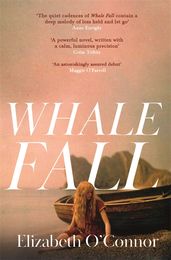Whale Fall
Elizabeth O'Connor
Synopsis
'I didn't want it to end' - Maggie O'Farrell
'Powerful . . . written with a calm, luminous precision' - Colm Tóibín
An Observer Best Debut of the Year 2024
It is 1938 and for Manod, a young woman living on a remote island off the coast of Wales, the world looks ready to end just as she is trying to imagine a future for herself. The ominous appearance of a beached whale on the island's shore, and rumours of submarines circling beneath the waves, have villagers steeling themselves for what’s to come. Empty houses remind them of the men taken by the Great War, and of the difficulty of building a life in the island's harsh, salt-stung landscape.
When two anthropologists from the mainland arrive, Manod sees in them a rare moment of opportunity to leave the island and discover the life she has been searching for. But, as she guides them across the island’s cliffs, she becomes entangled in their relationship, and her imagined future begins to seem desperately out of reach.
Elizabeth O’Connor’s beautiful, devastating debut Whale Fall tells a story of longing and betrayal set against the backdrop of a world on the edge of great tumult.
'The quiet cadences of Whale Fall contain a deep melody of loss held and let go. It is a gentle, tough story about profound change' - Anne Enright
Evocative and haunting . . . written with a care and restraint that is rare in a debut novel. It teems with visceral imageryJude Cook, Guardian
O’Connor’s beautifully evocative debut explores the liminal spaces between aspiration and disappointment, adolescence and adulthood, land and sea . . . a highly impressive coming-of-age taleThe Observer
An excellent debut . . . Brief but complete, the book is an example of precisely observed writing that makes a character’s specific existence glimmer with verisimilitude . . . To different eyes, the same island might look like a prison or a romantic enclave, but to actually apprehend the truth of a place or person requires patience, nuanced attention and the painstaking accrual of details. Understanding is hard work, O’Connor suggests, especially when we must release our preconceptions. While the researchers fail to grasp this, Manod does not, and her reward by book’s end, painfully earned, is a new and thrilling resolve.Maggie Shipstead, New York Times
